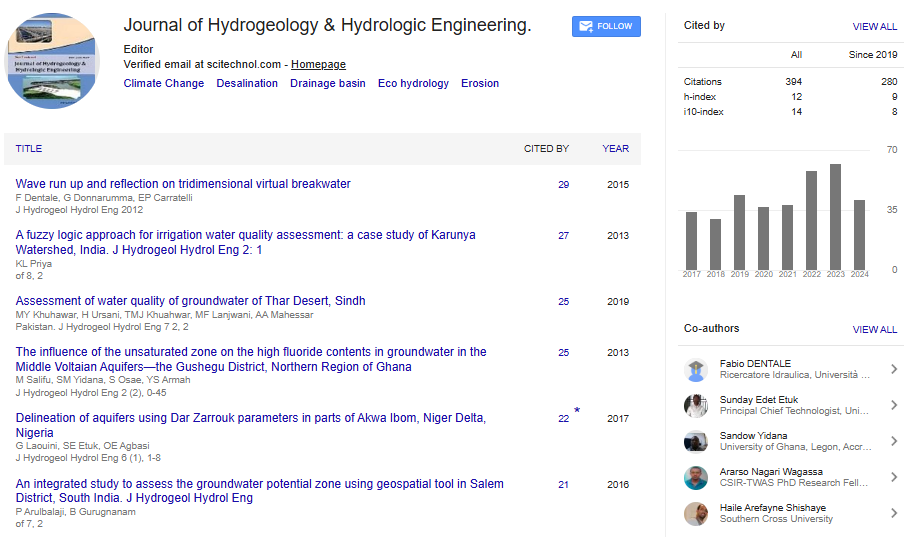Commentary, J Hydrogeol Hydrol Eng Vol: 12 Issue: 1
A Holistic Approach to Water Management and Ecosystem Health
Daniel Schertzer*
Department of Ecology, Sheffield Hallam University, Sheffield, UK
*Corresponding Author: Daniel Schertzer
Department of Ecology, Sheffield
Hallam University, Sheffield, UK
E-mail: schertzerd23@gmail.com
Received date: 25 January, 2023, Manuscript No. JHHE-23-90697;
Editor assigned date: 27 January, 2023, PreQC No. JHHE-23-90697 (PQ);
Reviewed date: 10 February, 2023, QC No. JHHE-23-90697;
Revised date: 17 February, 2023, Manuscript No. JHHE-23-90697 (R);
Published date: 24 February, 2023, DOI: 10. 4172/2325-9647.1000249
Citation: Schertzer D (2023) A Holistic Approach to Water Management and Ecosystem Health. J Hydrogeol Hydrol Eng 12:1.
Description
Ecohydrology is an interdisciplinary field that focuses on the interactions between water, ecosystems, and human societies. It seeks to understand and manage these interactions in ways that promote both ecological and human well-being.
At its core, ecohydrology is based on the idea that water is a fundamental driver of ecosystem processes and functions. Water availability and quality are critical for the growth and survival of plants and animals, the provision of ecosystem services such as water purification and carbon sequestration, and the maintenance of biodiversity.
However, water is also a finite resource that is subject to multiple competing demands from human societies, including agriculture, industry, and urban development. The challenge of ecohydrology is to balance these competing demands while also protecting and restoring ecosystem health [1].
To achieve this balance, ecohydrology takes a holistic approach to water management. It seeks to integrate ecological, social, and economic considerations into water management decisions, recognizing that these dimensions are interdependent and cannot be considered in isolation [2].
One key aspect of ecohydrology is the use of nature-based solutions to water management challenges. These solutions involve working with natural systems, such as wetlands, forests, and rivers, to provide water-related services and functions. For example, wetlands can be used to purify water and prevent flooding, while forests can regulate water flow and prevent erosion [3].
Another key aspect of ecohydrology is the use of innovative water management technologies and practices. These can include water recycling and reuse, rainwater harvesting, and precision irrigation technologies that use data and sensors to optimize water use in agriculture.
In addition to these technical solutions, ecohydrology also emphasizes the importance of community engagement and stakeholder participation in water management decisions. It recognizes that effective water management requires the involvement of all relevant stakeholders, including local communities, water users, and decisionmakers.
Ecohydrology
Ecohydrology has been applied in a variety of settings around the world, from arid and semi-arid regions to humid tropics and temperate zones. In each of these settings, ecohydrology has demonstrated its potential to support both ecosystem health and human well-being [4].
For example, in the semi-arid regions of southern Africa, ecohydrology approaches have been used to promote the restoration of degraded landscapes, improve water availability and quality, and support livelihoods through sustainable agriculture and eco-tourism [5].
In the temperate zone of Europe, ecohydrology approaches have been used to address the challenges of urbanization, including flood management, water quality improvement, and the creation of green spaces for recreation and biodiversity conservation.
In the humid tropics of South America, ecohydrology approaches have been used to support sustainable forest management, prevent soil erosion, and improve water quality for downstream communities.
Despite its potential, however, ecohydrology faces several challenges. These include the need for more research and data on the interactions between water and ecosystems, the need for greater coordination and integration between sectors and stakeholders, and the need for stronger policy and governance frameworks to support ecohydrology approaches.
Conclusion
Ecohydrology offers a promising approach to water management and ecosystem health that recognizes the interdependence of ecological, social, and economic considerations. By using naturebased solutions, innovative technologies, and community engagement, ecohydrology has the potential to support sustainable water management in a variety of settings around the world. To realize this potential, however, it is essential that we continue to invest in research, data, policy, and governance frameworks that support ecohydrology approaches.
References
- Jenerette GD, Gafford GA, Guswa AJ, Donnell JJ, Villegas JC, et al. (2012) Organization of complexity in water limited ecohydrology. Ecohydrology 5(2): 184-199.
- Bottrell DG, Schoenly KG (2018) Integrated pest management for resource-limited farmers: Challenges for achieving ecological, social and economic sustainability. J Agric Sci 156(3): 408-426.
- Guo Z, Xiao X, Li D (2000) An assessment of ecosystem services: Water flow regulation and hydroelectric power production. Ecol Appl 10(3): 925-936.
- Blanco HM, Costanza R, Chen H, Groot D, Jarvis D, et al. (2022) Ecosystem health, ecosystem services, and the well‐being of humans and the rest of nature. Glob Chang Biol 28(17): 5027-5040.
[Crossref] [Google Scholar] [PubMed]
- Petrovic P, Vukovic D (2016) Financial sources of small and medium enterprises for agribusiness and eco-tourism in Serbia. Econ Agric 63(4): 1433-1444.
 Spanish
Spanish  Chinese
Chinese  Russian
Russian  German
German  French
French  Japanese
Japanese  Portuguese
Portuguese  Hindi
Hindi 
